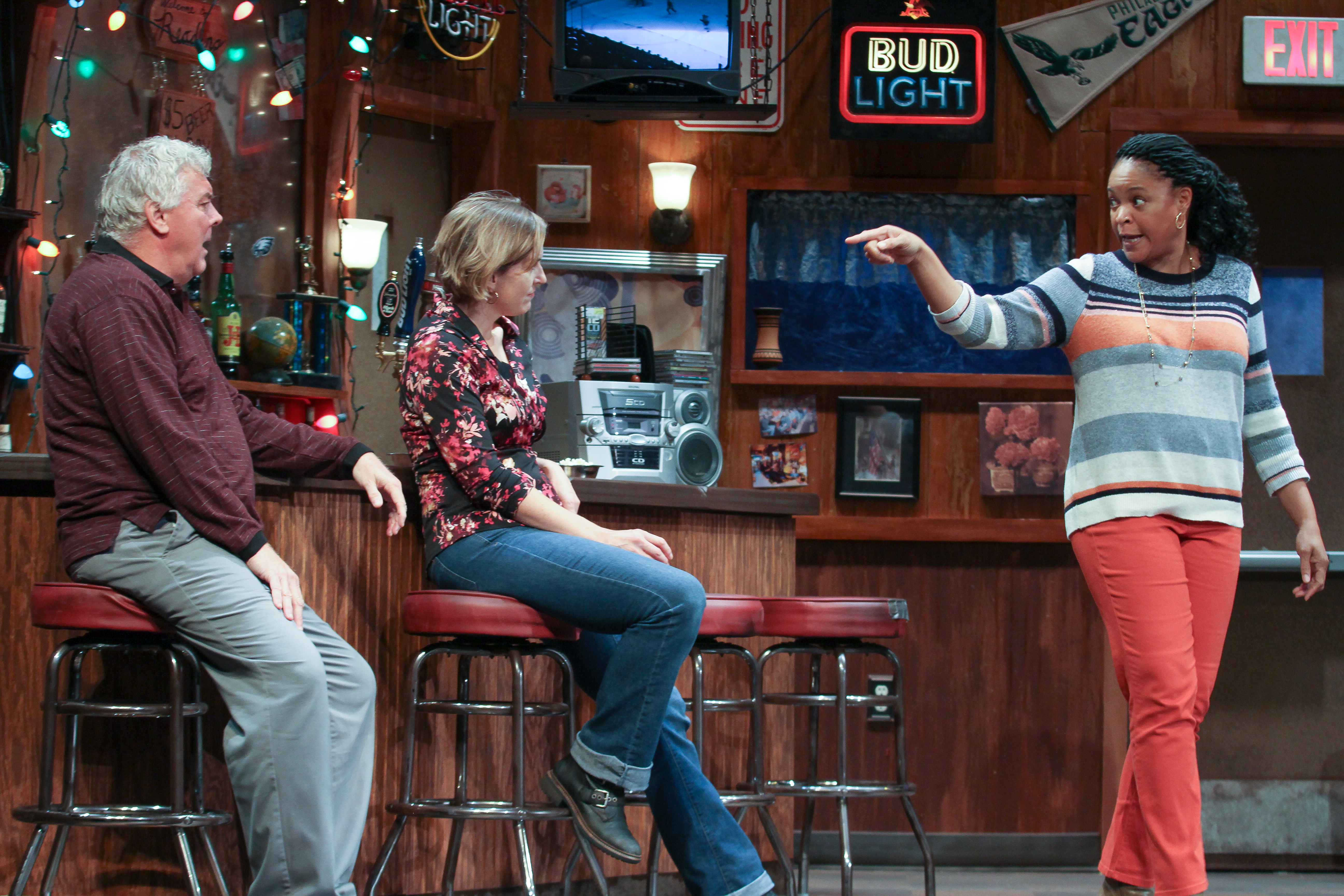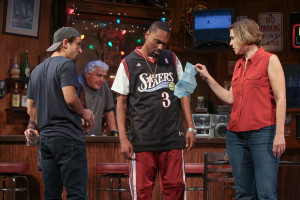
Philadelphia Theatre Company reawakens from its season-long semi-slumber with a solid presentation of Lynn Nottage’s SWEAT.
In its previous life, the company staged Nottage’s last Pulitzer-winner, Ruined, and the two plays share some similarities. Nottage has an impressive knack for crafting a coherent drama out of in-depth research into a community affected by a headline news topic―women in the Congolese civil war in Ruined, rust belt victims of American deindustrialization in SWEAT.
The socio-economic background of the play’s characters contrasted nicely with the crowd gathered for PTC’s opening night reanimation. A slender red carpet led to the entrance, hired and media photographers snapped attendees, an extended curtain speech thanked benefactors from the field of corporate law and the season sponsor Comcast (big donors got to meet the cast at a special pre-afterparty afterparty), an amused murmur went through the audience at a criticism of “Wharton grads”.
SWEAT won the Pulitzer and Tony in the year after Trump’s election; it will be the second-most produced play in the United States this season. New York’s Public Theatre is touring the play to small cities like Reading across the American rust belt, but many productions will be for audiences like PTC’s.

We gave SWEAT a standing ovation―deserved for the acting skills of the all-local cast and the skillful journalistic writing, but still peculiar. Why does SWEAT appeal to us, as aging urban middle-to-upper-to-upper-upper-class theatergoers? Do we hope to understand? Relate? Gawk? What do we applaud?
Just as Ruined took place mostly in a mining town poolhall, SWEAT’s action is largely confined to a working class bar in Reading, PA. These are places where the local watering hole still provides a community bedrock, and Christopher Ash’s set captures the look of a PA bar (though he misses the chance to embellish a scene set in late October 2008 with Phillies paraphernalia).
In 2000, when most of the action takes place (trigger warning: videos of George W. Bush), the patrons of the bar work on the line at Olstead’s factory in well-paid union jobs passed down from generation to generation. Life’s pretty good: Jason (Matteo Scammell, who seethes with requisite rage and masculinity) has almost saved enough to buy a Harley. His white single mother Tracey (Kittson O’Neill) dances with her African American friend Cynthia (Kimberly S. Fairbanks, in a performance of strength and complexity); their friend Jessie (Suli Holum) is too drunk as usual. Cynthia’s son Chris (Walter DeShields) spends his wages on a collection of new sneakers, but he’s looking to get out the factory through college. (The fine acting is only let down by a couple instances of exaggerated stage drunkenness.)
Nottage captures the voice and milieu of the factory workers, though her portrayal is more sympathetic than empathetic, only occasionally giving glimpses of the inner lives of the characters. Despite premiering in 2015, SWEAT feels like the oft-repeated New York Times profiles of working class Trump voters. (Look at these poor people! Here’s why they’re racist!) It’s unsurprising to learn Nottage was inspired to take on the project by a similar Times profile of a deindustrialized town.
As bartender Stan (Rich Hebert) serves up round after round, there are hints that something is rotten in Reading. Jason’s father Brucie (the excellent Damien J. Wallace) stops by to borrow money after losing his hope and sobriety along with his factory job. No one seems to acknowledge Colombian-American barback Oscar (J. Hernandez as a superbly stoical raisin in the sun). But the audience knows how bad things will get: we’ve glimpsed the fate of Jason and Chris.
In 2008, they’re newly released from prison. As the play builds toward their crime, its mystery casts a foreboding shadow over every joke and interaction. Racial tensions rise; friendships fray; the characters search for someone to blame. They look to scapegoats rather than the avaricious factory owners.
The play ends on a bittersweet note of racial and communal harmony, which the production emphasizes using a clip of Barack Obama, who was then soon to win his first term. In 2015, when SWEAT premiered, we might have forgotten that every dawn is a false dawn. It will take more to heal this society’s wounds than voting for HOPE, reading a well-written New York Times profile, or seeing woke theater, but I suppose we can start there.
[Philadelphia Theatre Company at the Suzanne Roberts Theatre] October 12-November 4, 2018; philadelphiatheatrecompany.org
